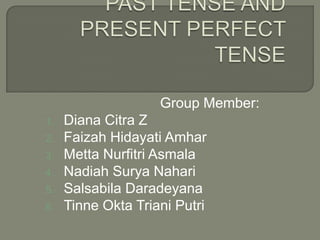
Past tense and present perfect tense 2
- 1. Group Member: 1. Diana Citra Z 2. Faizah Hidayati Amhar 3. Metta Nurfitri Asmala 4. Nadiah Surya Nahari 5. Salsabila Daradeyana 6. Tinne Okta Triani Putri
- 2. Simple past tense is to declare an act / event that happened in the past / make enormous time has passed and in the know.
- 3. Verba Nomina S + Verb 2 S + Were/Was + Adj
- 4. Example : Verba : I visited the museum last week Nomina : She was happy for birthday yesterday
- 5. It is used to expressed an action which happened or completed in past but usually the action which happened or completed at a short time before now (near past) not a very long time before now.
- 6. Verba Nomina S + Have/has + Verb 3 S + Have/has + been + Verb 3
- 7. Example : Verba : I have watched movies this week Nomina : I have been to the circus a few times
- 8. Past tense : I saw three movies yesterday. Present perfect tense : I have seen three movies since yesterday. Past tense : Nadya crashed her car last year. Present perfect tense : Nadya has crashed her car again. Past tense : I read a novel 2 days ago Present perfect : I have read this week Past tense : I lived in Cibinong five years ago Present perfect tense : I have lived in Cibinong for five years ago
- 9. No Simple Past Tense Present Perfect Tense 1. Has finished Has not finished yet 2. Old information New information 3. We know exactly when We don't know when 4. Used with for when the actions have already finished Used with for and since when the actions have not finished yet
- 10. Last night, I went to mall with my friends. We did several activity. First, we watched an horror movie in Cinema 21. After that, we played games in Game Zone. The last activity that we did is eat in food court at second floor. When we ate, I saw a little girl who separated with her mother. We helped that girl to find her mother. After we found her mother, we went to home. I felt so happy because I did several activity with my friends and we helped a girl who separated with her mother.